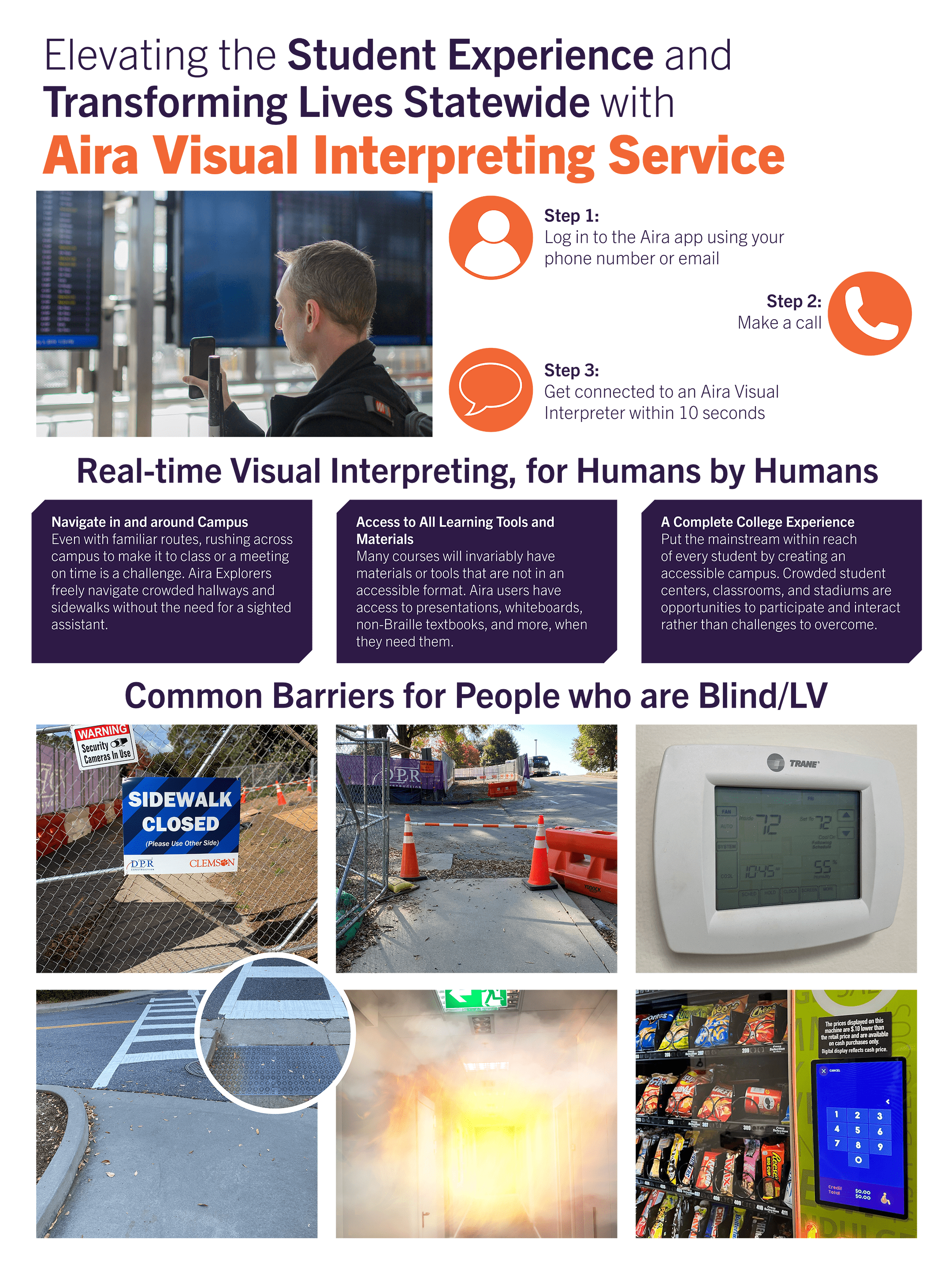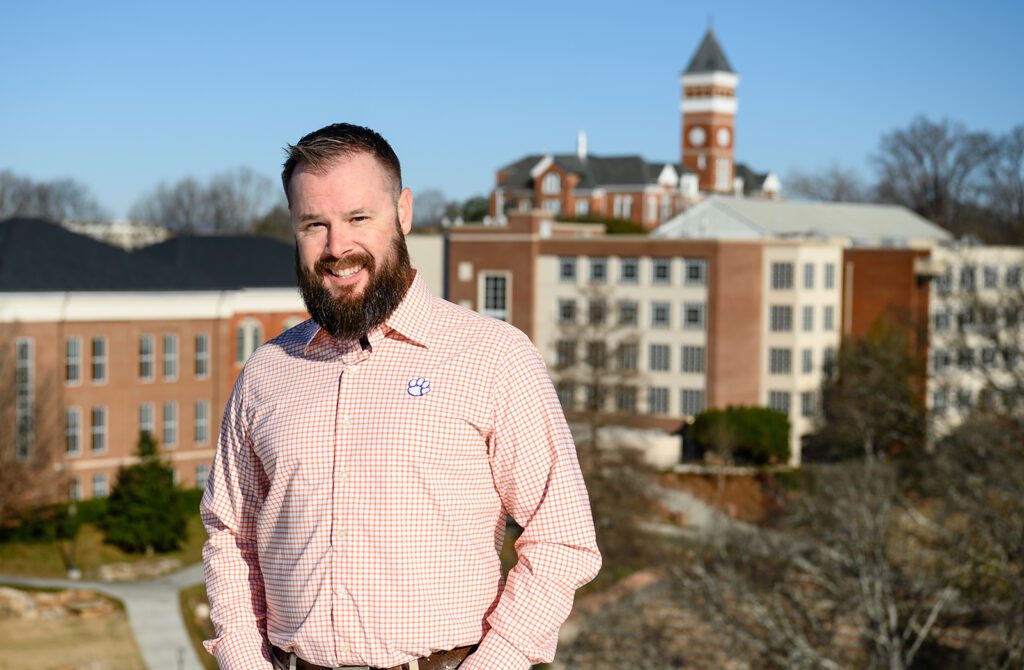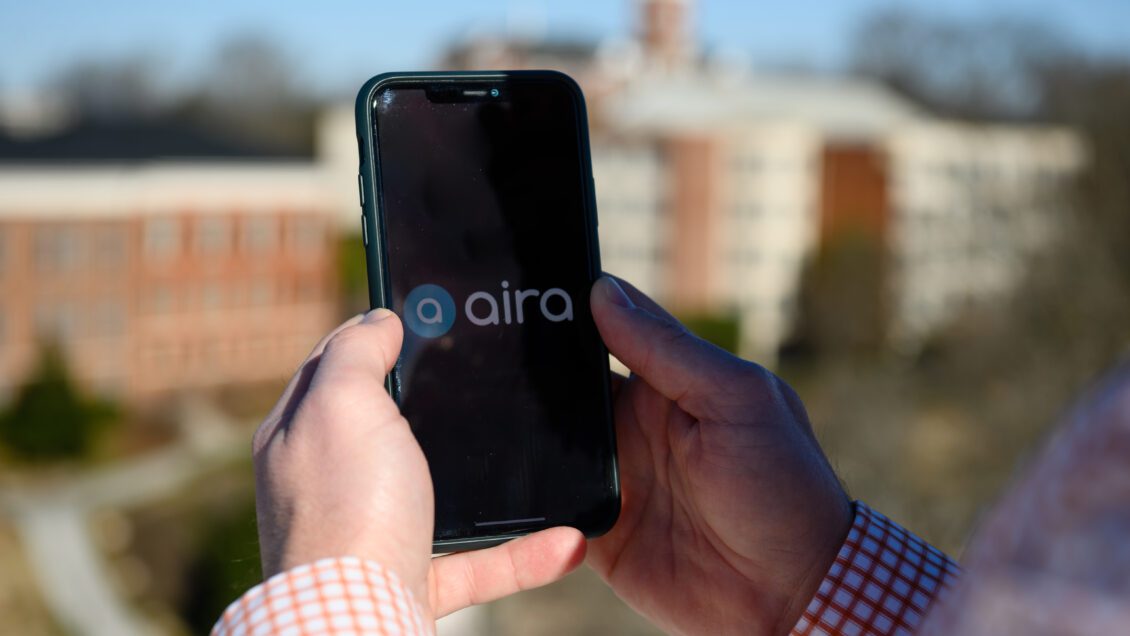Something as simple as turning up the heat in your home can be lifesaving during cold winter months. But what if you couldn’t see the temperature on your thermostat’s display? Or the expiration date on your medicine bottle? Or the construction fencing on your way across campus? Enter Aira (pronounced “eye-ra”), the 24-hour-a-day visual interpretation service now available to Clemson University faculty, staff, students and visitors.
By opening the Aira Explorer app and pointing a phone’s camera, Aira’s trained live agents will remotely interpret what is in the camera’s view or on-screen. Aira will help anyone who is blind or visually impaired navigate their surroundings at any Clemson site. Current coverage includes the main campus, and coverage will soon expand to every Clemson property statewide (including camps) and the entire city of Clemson.

Image Description
A flyer showing photos of a man using Aira by pointing his phone at a screen. Elevating the Student Experience and Transforming Lives Statewide with Aira Visual Interpreting Service. Step 1: Log into the Aira app using your phone number or email. Step 2: Make a call. Step 3: Get connected to an Aira Visual Interpreter within 10 seconds. Real-time Visual Interpreting, for Humans by Humans. Navigate in and around Campus: Even with familiar routes, rushing across campus to make it to class or a meeting on time is a challenge. Aira Explorers freely navigate crowded hallways and sidewalks without the need for a sighted assistant. Access to All Learning Tools and Materials: Many courses will invariably have materials or tools that are not in an accessible format. Aira users have access to presentations, whiteboards, non-Braille textbooks, and more, when they need them. A Complete College Experience: Put the mainstream within reach of every student by creating an accessible campus. Crowded student centers, classrooms, and stadiums are opportunities to participate and interact rather than challenges to overcome. Common Barries for People who are Blind/LV with photos of a “Sidewalk Closed” sign, cones on a sidewalk, a thermostat display, a crosswalk, a fire in a hallway, and a vending machine.
According to U.S. Census Bureau data, there are 42.5 million Americans with disabilities, not counting temporary disabilities or something as routine as getting your eyes dilated during a check-up, so an app providing this solution on Clemson’s campus is significant.
“Think of it as FaceTime with a random person,” said Hunter Duncan, Ph.D., an assistant director (academic) for Student Accessibility Services who participated in the Aira pilot. “It’s very user-friendly, and the app does well with different font sizes and brightness settings.”
Aira’s strength lies in the wide range of opportunities for its use. From reading a handwritten “class moved today” sign on a building door, the ISBN code on a library book or the route shown on a bus’s digital display, Aira interpreters can help. The app also features dictation and screen reader technology.
Anyone can use Aira while they are within the geographic parameters of a covered Clemson site. Additionally, Clemson employees and students can create an account and use Aira anywhere in the world.
Aira comes to Clemson thanks in part to University Facilities Strategic Operations Manager Chris Miller, who made implementing the service his focus while in the 2023 CU Grow staff development program. Each year, CU Grow participants complete a chosen service project benefiting the community. Miller and Facilities leadership first learned of Aira from Student Accessibility Services Director Margaret Camp and ADA Director Priscilla Harrison, and CU Grow helped bring things together.
“I wanted to do it, and CU Grow provided the opportunity,” said Miller. “We had a session about project management led by Strategic Initiatives that provided the group with a solid foundation, from tracking to implementation. Because of that, I found the entire process more streamlined and under control.”
Facilities provided funding for Aira and a network of groups across Clemson provided support, including Student Accessibility Services, CCIT, the Office of Access and Equity and Clemson Athletics.
I wanted to do it, and CU Grow provided the opportunity … helping people is the best part of my job.
Chris Miller, University Facilities strategic operations manager

Miller also collaborated with fellow CU Grow cohort member and Student Accessibility Services (SAS) Assistant Director Jamie Martin, who helped organize a pilot phase for Aira and provided subject matter expertise. Student Accessibility Services staff work to provide accommodations for students with disabilities, including classroom and teaching considerations for students who are blind or have low vision.
“Aira is such a neat product,” said Martin. “It allows folks to be independent and not have to rely on people nearby to do things for them on campus.”
Miller and the SAS office collaborate frequently, including one encounter several years ago that helped spark his passion for accessibility. While walking on campus with a student who was Deaf and blind to plan her route to class, he noticed she could not tell where a curb ended and the roadway began. University Facilities Maintenance Services teams soon expanded locations for truncated dome mats (those bright bumpy pads) across campus.
“Helping people is the best part of my job,” said Miller. “With Aira, we were trying to find a resource that can be used broadly instead of a more focused solution. It might not help a million people, but it will make a huge difference for the folks it does help.”
For more about Aira at Clemson, visit the University Facilities Aira page.



